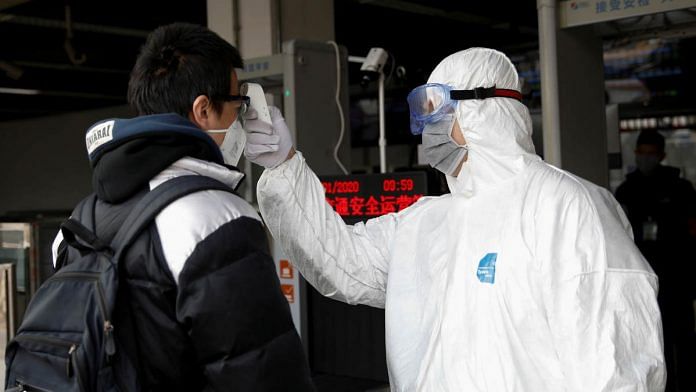New Delhi: With the global death toll from the coronavirus outbreak crossing 3,000, experts fear the epidemic could match the Asian flu pandemic that killed more than a million in 1957.
According to projections by infectious disease experts, the coronavirus outbreak may shape up on the same scale as the Asian flu pandemic of 1957 but is unlikely to be as “catastrophic” as the Spanish flu of 1918.
The 1918 Spanish flu pandemic had infected over 500 million people worldwide and resulted in the death of 20 to 50 million. There were no effective drugs or vaccines to treat the flu at the time, which took a heavy toll and wiped out entire families.
The pandemic came to an end in the summer of 1919 because those infected had eventually developed immunity.
Also read: 28 coronavirus cases in India, all international flights to be screened: Health Minister
Asian flu pandemic
The Asian flu pandemic of 1957 was caused by a virus originating from strains of avian influenza and human influenza viruses. It had entered the human population from birds, mostly among those residing in Southeast Asia.
The virus was first identified in February 1957 and has been considered as one of the “least severe” of the three influenza pandemics in the 20th century. It followed the Spanish flu pandemic of 1918 and preceded the Hong Kong flu pandemic of 1968.
The Asian flu was associated with “variations in susceptibility and course of illness”. The quick development of a vaccination against this virus and the ready availability of antibiotics had helped limit the virality of this pandemic.
Individual behaviour will determine impact of coronavirus
Experts also maintained that the “ultimate impact” of coronavirus or Covid-19 depends on how quickly and widely the virus spreads. It depends on the disease’s virulence (the degree to which it can make people sick) and the capability of health systems to tackle it.
Individual behaviour, they say, will also determine the impact of this outbreak. As with the Asian flu pandemic of 1957, coronavirus affects the elderly more than younger people.
Microsoft co-founder Bill Gates has also expressed concern over the predicted fatality rate of coronavirus being higher that the 1957 influenza pandemic.
According to the World Health Organisation, the mortality rate of coronavirus can range from 0.7 to 4 per cent. This would depend on the quality of the health-care systems.
Florian Krammer, a virologist specialsing in influenza and vaccines, however believes that in comparison to the past, the world has become better equipped to tackle such outbreaks.
“…we didn’t have the tools to diagnose diseases or antibiotics to fight secondary infections. Hospitals back then were places where you went to die, not to get treatment. And in 1918, the world was at war. And a lot of the people infected were soldiers stuck in trenches. Nutrition and health systems were much worse. That is, hopefully, not how this is going to play out,” Krammer has been quoted as saying.
Also read: How the spread of coronavirus is silencing critics of globalisation



